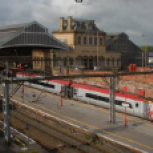
Preston
Granted city status in 2002, Preston became England’s 50th city in the 50th year of Queen Elizabeth II’s reign. Located in northwest England, it has a population of 135,100 (2010) with the surrounding area of central Lancashire adding a further 215,000 people. The commercial and administrative centre of Lancashire and the seat of Lancashire County Council, Preston is also home to the University of Central Lancashire, one of the UK’s largest and fastest-growing universities.
A former industrial city with a history in textiles, its main employment sectors today are in the services (including public administration and finance) and high value-added manufacturing. The latter includes a major centre for British defence contractor BAE Systems at nearby Warton. However, Preston’s key strength is its location and travel connections. Surrounded by breathtaking countryside, it is at the heart of Lancashire’s transport networks, easily accessible by road, rail, air and sea. Preston’s railway station is on the UK’s West Coast Main Line, equidistant between London and Glasgow, and forms a hub between the mainline and east-west links between the Fylde coast in the west and Yorkshire in the east.
Though rich in tradition, Preston is also a city on the move. The dockland area on the River Ribble, once a key feature of its industrial infrastructure, is today undergoing redevelopment to provide residential and commercial buildings. In 2013, a Preston and Lancashire City Deal was agreed with central government, paving the way for a £434m investment over a 10-year period. The investment, which will cover the cost of four highways and local school/health facilities, is expected to create 20,000 new jobs in the area.
SOME RELATED NETWORKS
ENTER.HUB
Procure
Article
The German Presidency conference ‘Europe’s Cities Fit For Future’
Article
URBACT and public procurement: a wealth of knowledge to share
News
EU Urban Agenda: what can URBACT cities bring to the table?
News
'Cities in Action-Stories of Change’ publication just released!
Article







